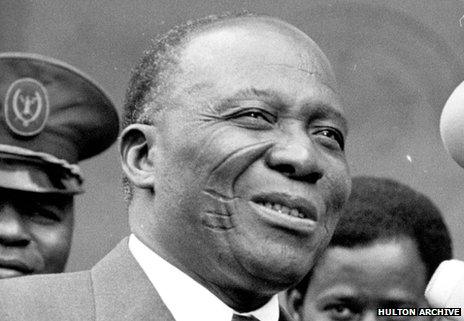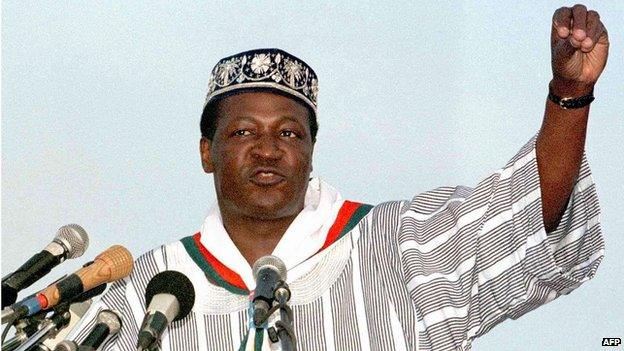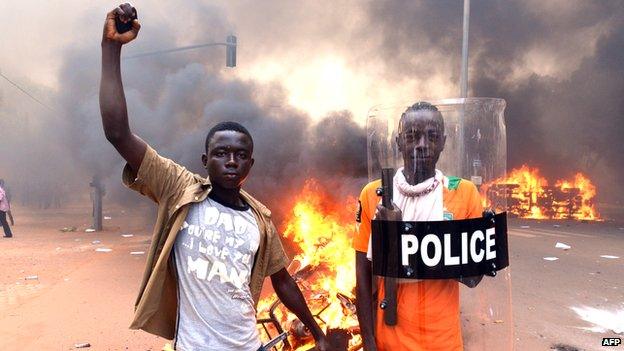Burkina Faso profile - Timeline
- Published
A chronology of key events :
1896 - Kingdoms now making up Burkina Faso become a French protectorate.
1919 - Upper Volta becomes separate constituent territory of French West Africa.
1958 - Upper Volta becomes autonomous republic within the French Community.
Independence
1960 - Upper Volta becomes independent with Maurice Yameogo as president.

Sangoule Lamizana came to power in a 1966 coup
1966 - Yameogo toppled in a military coup led by Sangoule Lamizana following unrest over a government austerity programme.
1970 - New constitution approved in a national referendum allows Lamizana to remain in power until 1975, when he was due to be replaced by an elected president; Gerard Ouedraogo appointed prime minister.
1974 - President Lamizana re-asserts authority by ousting Prime Minister Ouedraogo and dissolving parliament.
1977 - New multi-party constitution promulgated, allowing President Lamizana to remain in office. He wins 1978 presidential election.
Coups
1980 - President Lamizana is ousted in coup led by Saye Zerbo.
1982 - Saye Zerbo is overthrown in a coup led by Jean-Baptiste Ouedraogo following industrial unrest.
1983 - Capt Thomas Sankara takes power from Mr Ouedraogo in an internal power struggle. He adopts radical left-wing policies.
1984 - Upper Volta renamed Burkina Faso.
1987 - Thomas Sankara ousted and killed in a coup led by his close aide, Blaise Compaore.
1990 - Compaore introduces limited democratic reforms.
1991 - Compaore re-elected without opposition under a new constitution.
Return to democracy
1992 - Compaore's Organisation for Popular Democracy-Labour Movement wins a majority of seats in the first multi-party parliamentary elections since 1978.
1998 - Compaore wins presidential election by a landslide.

President Compaore was in power for 27 years
1999 June - General strike over economic grievances and alleged human rights violations.
1999 August - State-owned mining company Soremib announces the closure of the country's biggest gold mine.
2000 December - Government agrees to set up UN-run body to monitor weapons imports after allegations that it has been involved in smuggling arms to rebels in Sierra Leone and Angola.
2004 April - Military tribunal tries 13 people accused of plotting coup against President Compaore in October 2003. Army captain Luther Ouali jailed for 10 years for masterminding plot.
2005 November - President Compaore wins a third straight term in office.
2006 December - Burkina Faso postpones a regional economic summit after deadly gun battles between police and soldiers in the capital.
2007 May - The ruling party wins a majority in parliamentary polls.
2008 April - Two-day general strike follows weeks of protests about high living costs and call for wage increases.
2009 April - Parliament passes a law requiring at least 30% of candidates put forward for election by political parties to be women.
2010 July - France, US issue travel warnings, citing the possibility of kidnappings by al-Qaeda operatives.
2010 November - Gold mine officially opened. Premier Tertius Zongo says it will earn substantial revenue for the country.
Presidential elections. President Compaore gains another term in office.
Unrest
2011 March - Weeks of violent protests follow the death of a student in police custody.
2011 April - Soldiers, presidential guards mutiny over unpaid allowances. Thousands of people protest over food prices.
2011 July - Seven people are killed when government forces suppress mutiny in Burkina Faso's second city, Bobo Dioulasso.

Mounting protests against plans to extend President Compaore's rule led to his ouster by the military
2012 January - President Compaore sacks head of Burkina Faso's customs service, Ousmane Guiro, following the seizure of nearly $4m in two large suitcases traced by police to Mr Guiro.
2012 November - President Compaore mediates talks to resolve the crisis in Mali, where Islamists have taken control of the north.
2013 April - International Court of Justice in The Hague settles a decades-old border dispute between Niger and Burkina Faso.
2013 July - Thousands of demonstrators take to the streets over plans to create a Senate. Opposition leaders say the move will allow President Compaore to extend his rule.
2014 January - Demonstrators across the country oppose possible plans by President Compaore to prolong his rule.
Defectors from the ruling party found a new political movement to challenge the president.
2014 October - More mass protests against proposed constitutional changes to allow the president another five years in power turn into a mass uprising that drives President Compaore from office.
Military takes charge in move condemned by opposition, civil society groups, United States and African Union.
2014 November - Agreement reached on a framework for a transitional government to run the country until elections proposed for the end of next year. Political and military leaders choose former Foreign Minister Michel Kafando as interim president.
2015 April - Romanian security officer at a mine in the north is kidnapped. Islamist militants later claim to be holding him.
Interim parliament bars politicians allied to deposed president Blaise Compaore from running in the presidential and general elections planned for later in the year year.
2015 May - Work starts on exhuming what is believed to be the body of former leader Thomas Sankara ahead of DNA tests to determine the identity and cause of his death.
2015 September - Acting President Kafando faces down coup attempt by presidential guard allies of Blaise Compaore.
2015 November - Former prime minister Roch Marc Christian Kabore wins presidential election, comfortably beating former Economy and Finance Minister Zephirin Diabre.
2016 January - Islamist militants attack a hotel and cafe in the capital, Ouagadougou, killing 29 people, many of them foreigners.
2016 December - Islamists waving black flags storm a military base near the Mali border and kill 11 soldiers.
2017 February - Five Sahel countries agree to set up a joint counter-terrorism force.
2017 August - 18 people are killed in a terrorist attack on a Turkish restaurant in the capital Ougadougou.
2018 March - French embassy comes under attack. Sixteen people are killed, including eight gunmen.
2020 November - President Kabore wins re-election, although much of the north of the country is unable to vote because of the danger of jihadist attacks.